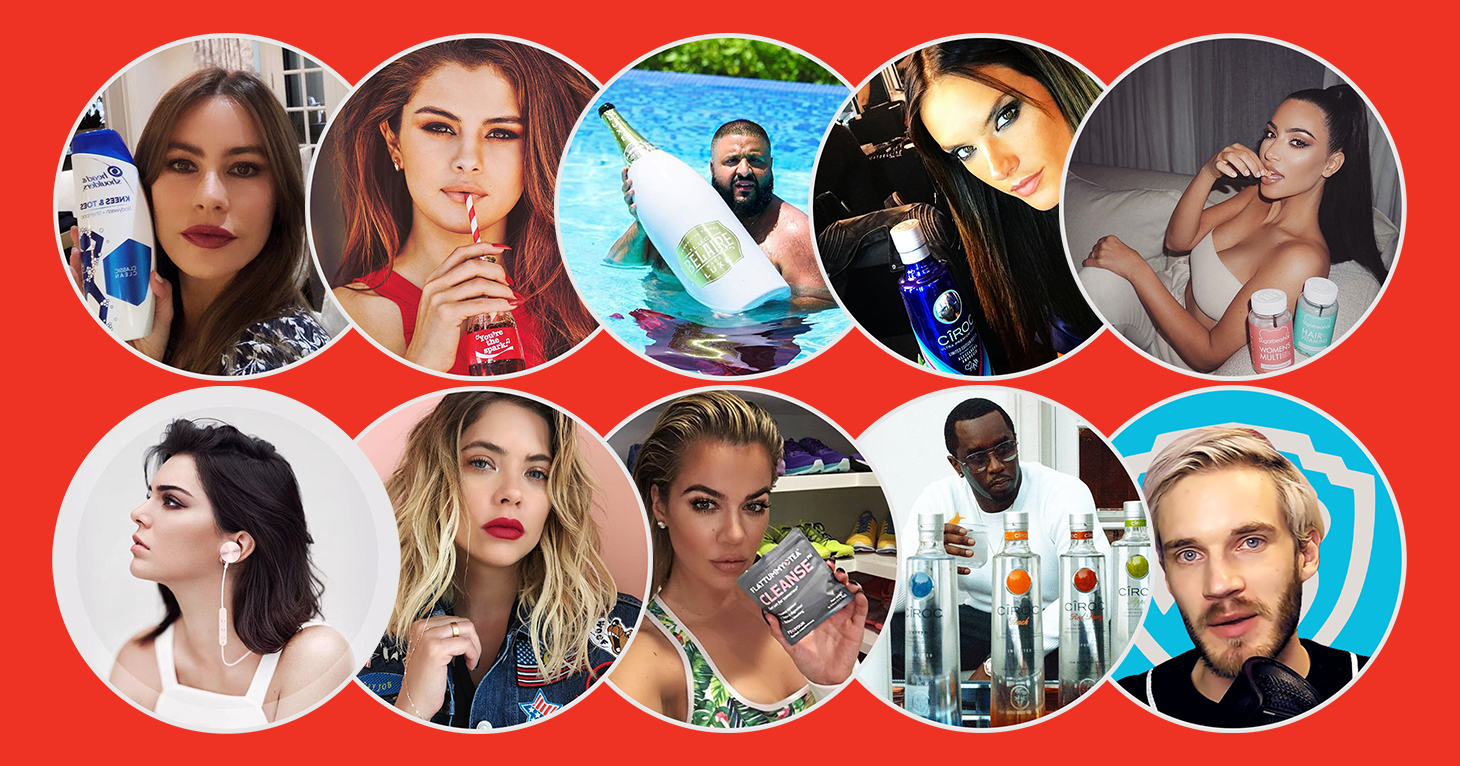
Companies Accused of Greenwashing
When companies green it, they better mean it.
See the FTC’s track record when it comes to social media influencer cases.
|
Since 2011, the FTC has resolved at least 24 investigations involving social media influencer marketing. In eleven of these cases, the FTC entered into consent orders with the companies, with two cases targeting the company’s marketing agency, and another three of the cases targeting the company’s owners. Each case resolution required compliance and monitoring from the companies but only three imposed monetary judgments against defendants and one other provided consumer redress. In the other 13 cases, the FTC elected not to bring charges against the companies after its investigations.
In April 2017, the FTC sent more than 90 educational letters to social media influencers and marketers concerning their legal disclosure obligations. Subsequently, in September 2017, the FTC sent warning letters to 21 of these social media influencers. Then, in October 2021, the FTC sent a Notice of Penalty Offenses to more than 700 marketers concerning the use of deceptive endorsements and testimonials and the law that applies to this marketing tactic, meaning that these marketers could now incur monetary penalties of up to $46,517 per violation. To date, no FTC action has been taken directly against an influencer, who has not been an agent and/or employee of the marketer.
| Target/Year | Platform | Issue | Outcome |
|---|---|---|---|
|
(Nov. 2011) |
Blog | Gift certificates were given to bloggers to encourage them to link to and comment on Hyundai videos and upcoming Super Bowl ads. Some bloggers did not disclose that they had received the certificates. | Closing letter |
| Hewlett-Packard and Porter Novelli
(Sept. 2012) |
Blog | Bloggers who received “Tackle the Holidays” gift packs failed to disclose that, along with gift certificates to give away to readers and free printables, they received $50 gift certificates to keep for themselves in the gift packs. | Closing letter |
|
(Feb. 2013) |
For its “TweetUp” campaign, Nordstrom Rack gave gifts to influencers for attending a store opening. Some influencers who posted about the opening did not disclose that they had received gifts. | Closing letter | |
| Village Green Network (VGN)
(Feb. 2014) |
Blog | VGN is a company that facilitates payments between bloggers and marketers. Some of the bloggers in VGN’s network did not adequately disclose that they were compensated to endorse products. | Closing letter |
|
(Mar. 2014) |
For its #Wandering Sole campaign on Pinterest, Cole Haan incentivized consumers to post pictures of its products by entering them in a $1,000 shopping spree contest without requiring proper disclosure of the contest. | Closing letter | |
|
ADT and Alison Rhodes-Jacobson (Mar./June 2014) |
Blog | ADT endorsers represented themselves as independent reviewers while promoting ADT on talks shows, websites, and blog posts without disclosing that they were compensated by the company. | Consent order as to ADT
Closing letter to Rhodes-Jacobson |
| Yahoo
(Sept. 2014) |
In-App Reviews | Yahoo employees who posted reviews of Yahoo apps in the iTunes app store did not disclose that they were employed at Yahoo. | Closing letter |
| Pedigree Dentastix
(Jan. 2015) |
Blog | Mars engaged bloggers to promote Dentastix products, but some of the bloggers did not adequately disclose their connections to the company. | Closing letter |
|
(Mar. 2015) |
Marketing agency for Sony, Deutsch LA, urged its employees to promote Sony’s PlayStation Vita on Twitter without instructing them to disclose their relationship with their client. | Consent order | |
|
(May 2015) |
Microsoft’s Nokia provided a free trip to Boston, a Lumia phone, and other incentives to influencers who tweeted about the phone’s photographic capabilities. A majority of influencers did not adequately disclosure their material connection to the company. | Closing letter | |
|
Machinima , Microsoft, and Starcom (Aug. 2015/Mar. 2016) |
YouTube | As part of an ad campaign for Microsoft and its ad agency Starcom, the YouTube channel Machinima paid influencers to post YouTube videos endorsing Microsoft’s Xbox One system and several games. The influencers failed to adequately disclose that they were being paid for their seemingly objective opinions. | Consent order as to Machinima
Closing letter to Microsoft and Starcom |
|
(May 2016) |
Lord & Taylor retained 50 fashion influencers to post Instagram pictures of themselves wearing a dress from a new collection, but failed to require the influencers to disclose that they received the dress for free, as well as payment in some instances. | Consent order | |
| Warner Brothers
(Nov. 2016) |
YouTube & Twitter | Warner Brothers’ influencer marketing campaign for the video game, Middle Earth: Shadow of Mordor, failed to adequately disclose that it paid the influencers thousands of dollars to post positive gameplay videos on YouTube and other social media platforms. | Consent order |
|
Various companies and influencers (Apr. 2017) |
After reviewing numerous Instagram posts by celebrities, athletes, and other influencers, FTC sent more than 90 letters reminding influencers and marketers that influencers must clearly and conspicuously disclose their material connection to brands on social media. | Educational Letters | |
|
(Sept. 2017) |
Youtube
Twitch |
Trevor “TmarTn” Martin and Thomas “Syndicate” Cassell, two social media influencers who are widely followed in the online gaming community, failed to disclose that they jointly owned the gambling service CSGO Lotto when endorsing the company. They also paid other influencers to promote the site without requiring them to disclose their material connection. | Consent Order |
|
(Sept. 2017) |
The FTC sent warning letters to 21 social media influencers that it had previously contacted regarding disclosure issues on their Instagram posts. The influencers have until Sept. 30, 2017 to inform the FTC whether or not they have a material connection to the brand and if they do, what steps they have taken to clearly and conspicuously disclose that connection. | Warning Letters | |
|
Creaxion Corp., Pettit, Inside Publications, LLC of Georgia, & Korotky (2018) |
Facebook
Advertorials in online and print publications Online Reviews |
Two Olympic gold medalists who were paid spokespeople for FIT Organic Mosquito Repellent failed to disclose that they were paid thousands of dollars to promote the product. Online consumer reviews did not disclose that reviewers were reimbursed for buying the product or had a relationship with the company promoting the product. | Consent Order |
| Artist Liquid Labs, Humble Juice Co., Hyde City Vapors, and Solace Vapor
(2019) |
Facebook
|
The FTC and FDA sent warning letters to four companies that failed to include statements warning consumers of the health and safety risks associated with nicotine in social media posts advertising flavored e-liquid products. The letters also reminded the companies that social media posts must clearly and conspicuously disclose material connections between influencers and brands. | Warning Letters |
|
(2019) |
LinkedIn
YouTube |
Devumi’s websites sold fake indicators of social media influence – including followers, subscribers, views, and likes – to users on LinkedIn, Twitter, and YouTube. | Consent Order |
|
Sunday Riley Modern Skincare and Sunday Riley (2019) |
Online reviews | Certain online reviews of Sunday Riley brand cosmetics on the Sephora website failed to disclose that the reviews were written by the company founder Sunday Riley and her employees. | Consent Order |
|
Teami, Adi Arezzini, Yogev Malul, and several celebrity influencers (2020) |
Celebrities who were paid to endorse Teami teas and skincare products failed to adequately disclose their material connection to the company in Instagram posts. | Consent Order as to Teami and its co-founders | |
|
Shop Tutors, Inc. d/b/a LendEDU, Materson, Lenhard, Coleman (2020) |
Online Reviews | Ninety percent of reviews of LendEDU on third-party platforms were written by LendEDU employees and their friends and family. (The company also represents that its rankings and ratings of financial products are objective even though companies may get higher rankings and ratings in exchange for payment.) | Consent Order |
|
(2019) |
Alo Yoga “ambassadors” failed to disclose that they received free products and other consideration for endorsements. | Closing Letter | |
|
(2021) |
Various platforms, including social media channels | The FTC sent a Notice of Penalty Offenses to more than 700 businesses placing them on notice that they could incur significant monetary penalties if they use endorsements and testimonials in ways the FTC has determined to be unfair and deceptive in administrative actions. | Notice of Penalty Offenses |
Updated 2/16/22
When companies green it, they better mean it.
Why the FTC should consider virtual influencers as it reviews its Endorsement Guides.
A review of TINA.org’s work exposing deceptive marketing tactics by social media influencers.


